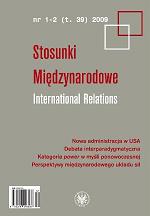„Obcość” jako kategoria analityczna stosunków międzynarodowych
„Otherness” as an analytical category in international relations
Author(s): Łukasz ŁotockiSubject(s): Politics / Political Sciences
Published by: Wydawnictwa Uniwersytetu Warszawskiego
Keywords: opozycja swojskość-obcość; William Polk; William Graham Summer; dyskryminacja obcych; nietolerancja; filoksenia; ksenocentryzm
Summary/Abstract: This article presents various attempts to defi ne the category of “otherness” and points to their common elements. A consideration of how precisely to understand “otherness” is necessary as it is used with a range of meanings. The author’s starting point is the proposition that the “belonging-otherness” antithesis is connected to the origins of international relations. The core element linking the various meanings (or correlates) of the concept of “otherness” is the feeling of distance felt towards the people or groups that are deemed to be “other”. Particular social mechanisms (and behaviours) can be associated with the category of “otherness” such as: stereotyping, prejudice, stigmatization, discrimination, marginalization and exclusion, xenophobia, racism, intolerance, ultimate attribution error, moral alchemy, philoxenia and xenocentrism. Most of these behaviours are negative in character, which however does not mean that “otherness” as such should be eliminated from international relations (this is in any event impossible). What should be eliminated are negative behaviours and the violation of permissible boundaries in relation to particular attitudes (e.g. it is impossible to eliminate stereotyping altogether, but what should be eliminated is stereotyping which signifi cantly distorts relationships). In itself reserve towards someone “other” is natural, especially as such reserve is closely related to the category of group identity. The divide causes the relationship between those who “belong” and those who are “other” to be more interesting, authentic and productive.
Journal: Stosunki Międzynarodowe
- Issue Year: 41/2010
- Issue No: 1-2
- Page Range: 31-52
- Page Count: 22
- Language: Polish

